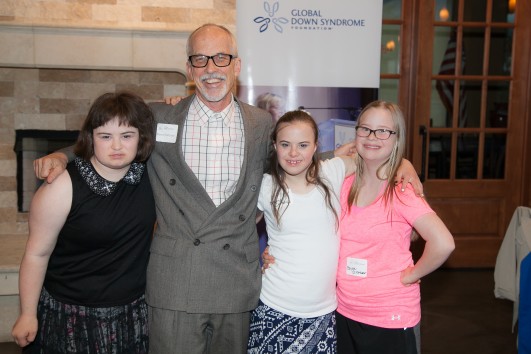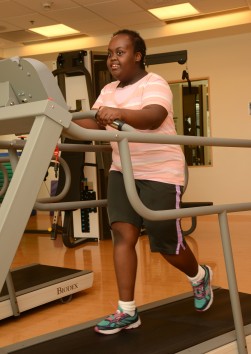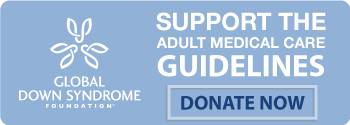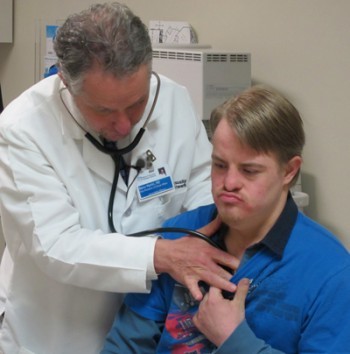Global Down Syndrome Foundation Announces Plan to Publish Medical Care Guidelines for Adults with Down Syndrome
Denver, CO (March 8, 2016) — Global Down Syndrome Foundation announced that it will produce and publish Medical Care Guidelines for Adults with Down Syndrome. The guidelines, unveiled at the Down Syndrome Affiliates in Action Conference (DSAIA) in Charlotte, NC, will be a community resource with support from Down syndrome organizations in the United States and vetted by a national clearing house for healthcare guidelines.
In Charlotte, eight local Down syndrome organizations pledged $12,000 to support Global Down Syndrome Foundation’s plan. It is anticipated that additional Down syndrome organizations and foundations will join in support. The pledges help offset the significant costs associated with creating, vetting, and publishing the guidelines. The guidelines will be written and published over an 18 month period with the help of a professional working group including Down syndrome medical experts. The published guidelines will be offered at no cost to self-advocates, physicians, family members, caretakers, and Down syndrome organizations locally, regionally, and nationally.
“Having accurate, updated medical care guidelines for adults with Down syndrome is critical to the long-term health of every person in our community,” said Robbin Thomas Lyons, president of Wisconsin Upside Down. “We commend and wholeheartedly support Global for taking on this important work.”

Dr. Dennis McGuire, Global’s award-winning behavioral health specialist and author, with self-advocates at the Spring 2015 Educational Series
The most recent guidelines for adults with Down syndrome were published in 2001 and the fifteen years since have been marked with many advancements in the areas of medical care and research surrounding Down syndrome. Most notably, the life expectancy for someone born with Down syndrome has more than doubled since 1983, from 25 years to 60 years today. With this dramatic advancement, the Down syndrome community faces new challenges including dementia and Alzheimer’s disease, which is estimated to affect over fifty percent of people with Down syndrome and at a younger age than in the typical population.

Self-advocate Shima works to stay healthy
The ultimate aim of the guidelines is to improve the quality of care and outcomes for adults with Down syndrome. To this end, the guidelines will develop statements to help clinicians and patients decide on appropriate healthcare for specific clinical conditions and situations.
“We have spent a lot of time and resources researching the best way to go about doing this, and we are so pleased to be able to start this important work with the support of DSAIA and so many local Down syndrome organizations,” said Michelle Sie Whitten, President and CEO of Global Down Syndrome Foundation.
About the Global Down Syndrome Foundation
Global Down Syndrome Foundation is a public nonprofit dedicated to significantly improving the lives of people with Down syndrome through research, medical care, education and advocacy. Global supports two affiliates which together constitute the only academic home in the United States committed solely to research and medical care for people with Down syndrome – the Crnic Institute for Down Syndrome and the Sie Center for Down Syndrome. Global also publishes Down Syndrome World, a national award-winning quarterly magazine. For more information, visit www.globaldownsyndrome.org. Follow Global Down Syndrome Foundation on Facebook & Twitter @GDSFoundation.
MEDIA CONTACT:
Taylor Shields, Global Down Syndrome Foundation
303 468 4975
TShields@GlobalDownSyndrome.org
Recent Posts
- Singer Jordin Sparks Performs and Rep. Frankel and Rep. Hudson Honored at Global Down Syndrome Foundation’s May 9th AcceptAbility Gala in DC
- Global Down Syndrome Foundation is Proud to Support Cheeky Awareness Video “Assume That I Can” Taking the Internet by Storm
- Global Down Syndrome Foundation Launches Matching “21 for 21” Campaign for World Down Syndrome Day with Support from the Safeway Foundation
- Global Down Syndrome Foundation Applauds House Energy & Commerce Committee for Advancing Legislation to Authorize Down Syndrome Research Program at NIH
- Important NIH INCLUDE Legislation Aimed at Increasing Lifespan and Dramatically Improving Health Outcomes for People with Down Syndrome Introduced by GLOBAL Champion, Congresswoman Cathy McMorris Rodgers



 Experience our inspirational and groundbreaking videos and photos. Our children and self-advocates are beautiful AND brilliant!
Experience our inspirational and groundbreaking videos and photos. Our children and self-advocates are beautiful AND brilliant! Make sure your local Representatives are on the Congressional Down Syndrome Task Force.
Make sure your local Representatives are on the Congressional Down Syndrome Task Force.